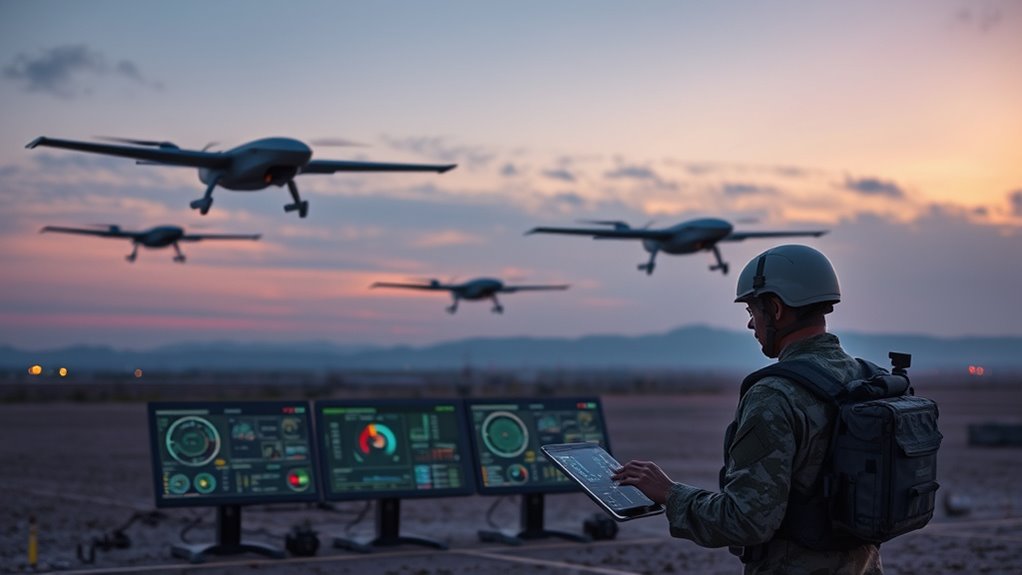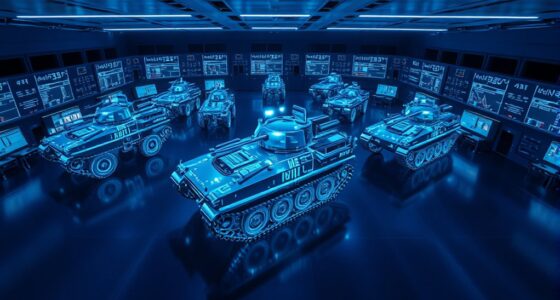AI transforms defense by enabling autonomous drones that improve reconnaissance and combat operations, allowing real-time intelligence gathering without human control. Predictive maintenance uses AI to forecast equipment failures, keeping critical systems operational and secure. Chatbots streamline communication and spot cybersecurity threats, enhancing overall security measures. These applications boost efficiency and safety while raising ethical considerations and cybersecurity challenges. Continuing to explore these innovations will reveal how they shape future defense strategies and address emerging concerns.
Key Takeaways
- Autonomous drones enhance reconnaissance, surveillance, and combat capabilities by operating in complex environments with real-time intelligence relay.
- Predictive maintenance utilizes AI to forecast equipment failures, minimizing downtime and safeguarding critical defense assets.
- Chatbots streamline military communication, administrative tasks, and can identify cybersecurity threats proactively.
- AI-driven cybersecurity measures protect sensitive defense systems from hacking, espionage, and cyberattacks targeting autonomous and networked assets.
- Ensuring ethical deployment and strict oversight of autonomous systems addresses accountability, moral concerns, and adherence to international law.

Artificial intelligence is transforming defense strategies by enabling faster decision-making, improved threat detection, and autonomous operations. As you integrate AI into military systems, you must also confront cybersecurity threats that could compromise sensitive data or disrupt critical functions. Hackers and malicious actors are increasingly targeting AI networks, seeking to manipulate or disable autonomous systems. Ensuring robust cybersecurity measures isn’t just a technical concern; it’s a strategic necessity. You need to stay ahead of threats by continuously updating security protocols, employing encryption, and monitoring for unusual activity. Equally important are the ethical considerations surrounding AI deployment. Autonomous systems, such as drones or decision-making algorithms, raise questions about accountability, the potential for unintended harm, and compliance with international law. You must carefully evaluate the moral implications of deploying AI in conflict zones, especially when lives are at stake. Transparency and adherence to ethical standards help maintain public trust and uphold international norms.
Integrating AI into defense requires robust cybersecurity, ethical oversight, and ongoing vigilance to protect sensitive operations and uphold international standards.
Autonomous drones exemplify AI’s potential to revolutionize reconnaissance, surveillance, and even combat operations. These drones can navigate complex environments, identify targets, and relay real-time intelligence without direct human control. This reduces risks to personnel and accelerates response times. However, deploying such systems demands rigorous oversight to prevent misuse or accidental escalation. You should implement strict operational protocols, ensuring drones operate within legal and ethical boundaries. The autonomous nature of these drones also highlights the importance of cybersecurity. If compromised, they could be redirected or used against your own forces, emphasizing the need for layered security defenses. Additionally, understanding how Self Watering Plant Pots work can provide insights into automated systems and reservoir management that are relevant in designing autonomous systems with fluid control.
Predictive maintenance is another key AI application that enhances operational readiness. By analyzing data from equipment sensors, AI can forecast failures before they happen, minimizing downtime and costly repairs. This proactive approach keeps your fleet, vehicles, and machinery in essential condition, ensuring mission success. Nonetheless, collecting and analyzing vast amounts of data introduces cybersecurity challenges. Unauthorized access to maintenance data could lead to sabotage or espionage. You must protect these systems with secure networks and regular audits. Additionally, ethical concerns about data privacy and surveillance should guide your data management policies, ensuring compliance with legal standards and respecting personnel rights.
Chatbots are transforming communication within defense organizations. They provide instant assistance, answer queries, and help streamline administrative tasks. As you implement chatbots, consider their accuracy and reliability, especially when dealing with sensitive or classified information. Ethical use involves safeguarding data privacy and preventing misuse. Moreover, chatbots can be programmed to identify and flag cybersecurity threats, acting as an early warning system. This proactive stance helps defend against cyberattacks while maintaining efficient communication channels. Balancing technological advancement with security and ethics is vital as you leverage AI to strengthen defense capabilities.
Frequently Asked Questions
How Do AI Ethics Impact Defense Applications?
You need to take into account AI ethics because AI moral dilemmas, like decision accountability and potential harm, directly impact defense applications. Bias mitigation is essential to prevent unfair outcomes and ensure fairness in autonomous systems. By addressing these ethical concerns, you help maintain trust, avoid unintended consequences, and ensure that AI supports responsible and transparent defense operations, ultimately aligning technology with moral standards and international laws.
What Are the Legal Implications of Autonomous Drones?
You should realize that autonomous drones raise serious legal liability and privacy concerns. If a drone causes unintended harm, who’s responsible? Are privacy rights violated during surveillance? These questions complicate deployment, risking legal action and public outrage. You need clear regulations and accountability measures to guarantee responsible use. Without them, autonomous drones could undermine legal standards and erode public trust, making their deployment a risky endeavor.
How Is AI Data Security Managed in Defense?
You manage AI data security in defense by implementing robust data encryption to protect sensitive information from breaches. You also enforce strict access control measures, ensuring only authorized personnel can access critical data. Regular security audits and real-time monitoring help identify vulnerabilities early. By combining these strategies, you strengthen your defense systems against cyber threats and maintain the integrity and confidentiality of crucial AI data.
Are AI Defense Systems Vulnerable to Hacking?
Yes, AI defense systems are vulnerable to hacking due to cyber vulnerabilities that can lead to system penetration. Adversaries may exploit weaknesses in the system’s security protocols, risking unauthorized access or manipulation. To protect these systems, you need to implement robust cybersecurity measures, regularly update security protocols, and monitor for potential threats. Staying vigilant helps prevent malicious actors from compromising critical AI-driven defense operations.
What Is the Cost-Effectiveness of AI in Defense?
Imagine a knight’s armor from medieval times—today, AI makes defense more cost-effective. You’ll find that AI boosts cost efficiency and saves budgets by automating tasks like predictive maintenance and drone operations. These technologies reduce manpower needs, prevent costly failures, and enhance mission success. Overall, AI provides significant budget savings, making defense strategies smarter and more affordable in the long run, much like having a trusty, ever-vigilant squire.
Conclusion
As you explore these AI applications—autonomous drones, predictive maintenance, and chatbots—you realize how seamlessly technology integrates into defense. It’s almost like the innovations were waiting in the wings, ready to transform the battlefield before you even noticed. With each breakthrough, you see a future where smarter, faster responses become the norm, making the line between science fiction and reality blur. In this silent dance of progress, AI quietly shapes the defense landscape ahead.









